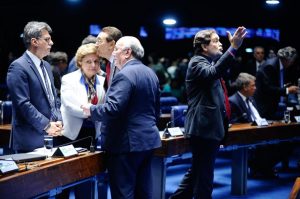
After weeks of intense discussion between parliamentarians and negotiations with the Ministry of Finance, the Senate Plenary approved on Tuesday (7) the validation of tax incentives granted by states to companies. There were 63 votes in favor, 7 against and 1 abstention. Two amendments presented at the Plenary were incorporated into the text, which now goes to the Chamber of Deputies.
PLS 130/14, by Senator Lúcia Vânia (PSDB-GO), validates the tax benefits (generally related to ICMS) that states offer companies to settle in their territories, generating jobs and income and promoting growth economic.
To grant the benefits, it is necessary to obtain unanimous agreement from the other states in the National Council for Farm Policy (Confaz). Over the years, many incentives have been offered that do not comply with this standard. Competition between states in the concession is known as "fiscal war".
After the approval of PLS 130, the Plenary rejected the request for inversion of agenda presented by senators from São Paulo, Marta Suplicy (PT), Aloysio Nunes Ferreira (PSDB) and José Serra (PSDB). PLC 15/2015 - complementary, which changes the state debt index, remains as the third item on the agenda, after the draft Biodiversity Law (PLC 2/2015).
Contents
The convalidation bill, which had already been approved last year by the Economic Affairs Commission (CAE), was voted as a substitute offered by the rapporteur, Senator Luiz Henrique (PMDB-SC). In addition to regularizing all existing tax incentives, the text changes the rules for offering new ones, ending the requirement for unanimity in Confaz. Now, the consent of two thirds of the states or one third of the states of each region is required.
Rules are also presented that the benefits granted must follow from the new measures, as conditions for their validity and maximum term that the concession can last.
Two amendments, by Lúcia Vânia and Senator Ricardo Ferraço (PMDB-ES), were approved to complement the project. Ferraço's amendment highlights the incentives granted for commercial activities, which may extend for up to five years. In the previous version of the project, only one year was allowed.
Lúcia Vânia's amendment, on the other hand, cancels the punishments provided by law for states that granted incentives without authorization from Confaz. These punishments will be removed in the case of debt forgiveness of the companies receiving the benefits. The objective is to prevent companies from having to pay ICMS if the incentives they received are considered illegal. The project also seeks to prevent the unpaid ICMS from the states of origin being subsequently charged by the states of destination.
Next Steps
The president of CAE, Delcídio do Amaral (PT-MS), warned his colleagues that it is necessary not to close the matter only in the approval of the validation. According to him, it is necessary to think about a broad reform of the ICMS
- We have a big homework ahead of us. The ICMS reform is 70% of the tax reform. It passes through the Senate, the federal government, the states and Confaz. It needs to be a negotiated solution. The decision does not end in today's session - he warned.
Senator Ronaldo Caiado (DEM-GO) was concerned about the pace of processing the proposal in the Chamber. He proposed to condition the quick analysis of the validation by the deputies to the approval, in the Senate, of the new index of the debts of the states and municipalities. Thus, he believes, it will be possible to guarantee agility.
- We only have one condition to make her walk in the Chamber: we link the approval to the vote here on the debt renegotiation. Otherwise, we will approve the validation here, it would arrive at the Chamber, it would not have continuity, and our states [would be] unable to react - he asked.
Abstention
The only abstention recorded in the vote was that of the project's own rapporteur, Luiz Henrique. He said he held a meeting with Confaz, about a month ago, in his office. In it, the members of the council asked him that an eventual decision by the Senate would wait until the 11th, when the state finance secretaries will try to reach a consensus on the subject.
As the Senate vote took place earlier, said the senator, his abstention vote would be a way to honor the agreement with Confaz.
- Although I was the original rapporteur for the matter that reached the Senate, my vote will be abstention. It is the vow to keep my word - he justified.
Source: Agência Senado (07/04)



